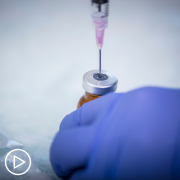Colon Cancer Treatment and Research News from Patient Empowerment Network on Vimeo.
What’s the latest colon cancer treatment and research news from the American Society of Clinical Oncology (ASCO) meeting? Dr. Smitha Krishnamurthi shares updates about research findings that were presented at the meeting along with exciting ongoing research in colon cancer.
Dr. Smitha Krishnamurthi is a gastrointestinal medical oncologist at the Cleveland Clinic. Learn more about Dr. Krishnamurthi here.
See More From The Pro-Active Colon Cancer Patient Toolkit
Related Resources:
Transcript:
Katherine Banwell:
Welcome, Dr. Krishnamurthi. Would you mind Would you mind introducing yourself?
Dr. Krishnamurthi:
Sure, it’s my pleasure. Thank you for having me, Katherine. I’m Smitha Krishnamurthi. I’m a medical oncologist. I specialize in taking care of patients who have colorectal cancer and other gastrointestinal cancers. As a medical oncologist, I treat patients with drug therapy like chemotherapy and immunotherapy.
Katherine Banwell:
And where are you located?
Dr. Krishnamurthi: I work at Cleveland Clinic in Cleveland, Ohio.
Katherine Banwell:
Excellent. Thank you so much.
Cancer researchers came together recently to share findings at the annual American Society of Clinical Oncology meeting, also known as ASCO. Are there highlights from the meeting that patients should know about?
Dr. Krishnamurthi:
Yes. That’s always such an amazing gathering of knowledge. Thankfully, it’s continued virtually at least due to the pandemic. This past ASCO last month, some of the major highlights in colorectal cancer were the final overall survival results were presented from the study of pembrolizumab versus chemotherapy as first-line treatment for patients with metastatic colorectal cancer with deficient mismatch repair or MSI high status.
These are the patients who are predicted to benefit from immunotherapy.
We’d already seen earlier results that the patients who received the immunotherapy up front had a much-improved time for the cancer to regress. Here, they presented the overall survival results, which showed that the median survival for patients who received chemotherapy was three years, meaning half the patients lived shorter time, half lived longer. For the patients who received the pembrolizumab, they hadn’t even reached the median survival at five years.
So, it looks very important that we know this MSI status or mismatch repair status from the beginning, so that we can offer the right patients immunotherapy first.
Other highlights were, for example, for patients who have cancers that overexpress HER2/neu. It’s an oncogene. When it’s overexpressed, it tends to drive growth of cancers.
We don’t have any FDA-approved drugs for HER2-amplified colorectal cancer, but there are many studies showing that those patients with that type of cancer benefit from targeting this HER2 protein. There are, of course, approved drugs for HER2/neu-amplified breast cancer and stomach cancer. One of these drugs is trastuzumab deruxtecan.
It’s a drug that targets the HER2/neu protein, but it’s connected with chemo. So, it’s like bringing chemo right to the tumor. The results showed a very high response rate. But it does have a peculiar toxicity of causing inflammation in the lung. So, it’s another treatment option that could be approved. It’s good to see that we’re getting more treatment options there.
Katherine Banwell:
What are you excited about when it comes to colon cancer research?
Dr. Krishnamurthi:
There are so many important questions we still need to learn the answers to. I find that patients who have, of course, a mutation of the KRAS or NRAS gene and have metastatic cancer, they have fewer treatment options than when those genes are normal.
KRAS is a very important oncogene driver of cancer in colorectal cancer, but also in lung cancer and pancreatic cancer. For many decades, it was thought that there was no way to target this protein. Now, we’re seeing that there’s a certain type of KRAS mutation – KRAS G12C – that can be targeted with drugs that now are approved in lung cancer.
It’s a small fraction of colorectal cancer patients who have that mutation, but it’s like we’re beginning to crack this code. The most common KRAS mutation is G12D. There is a company – Mirati – that has a candidate G12D inhibitor that’s going to enter clinical trials this year. It’s very exciting.
There was recently a press release onvansertib, which is a polo-like kinase inhibitor, combined with chemotherapy, a second-line treatment for patients with KRAS-mutant colon cancer, showing a much higher response rate than we would expect with the chemotherapy alone.
That will need to be validated in a large, randomized trial, but that’s looking very exciting. Then the other aspects that I’m most excited about are how to get immunotherapy to work for more of our patients.
We know that patients who have abnormal mismatch repair or MSI-high cancers can benefit remarkably in the metastatic setting and there are studies going on in the early-stage setting and there are reports of it looking quite promising. But how do we get it to work for the majority of patients who have normal DNA mismatch repair or MSS, microsatellite stable cancers? That’s an area of great interest.
We’ve seen a study in the Netherlands where they treated patients with normal DNA mismatch repair, early-stage colon cancer, with just two doses of immunotherapy before going to surgery for their early-stage cancer. I was surprised to see like four out of 15 patients responded to the treatment. Perhaps earlier stage cancers may be more responsive to immunotherapy. Definitely looking forward to more updates from that study, which we’ll probably hear in the fall at the European Society of Medical Oncology meeting in fall of 2021.
Then, of course, the other area that really interests me is what is causing this epidemic of colorectal cancer in young adults? This is really a matter of laboratory studies and epidemiologic studies, but that’s also an area of great interest.
Katherin Banwell:
There’s an epidemic among younger people?
Dr. Krishnamurthi:
Yeah. I think of it as an epidemic in that colorectal cancer has definitely been increasing in young Americans and young people around the world in many countries.
Basically, clearly, there’s been an increase since the 1980s. It seems to be something environmental because it’s related to time. So, it’s not inherited. Some of our patients below the age of 50 diagnosed with colorectal cancer do not have an inherited cause. A study from Ohio State found that 16 percent have an inherited cause. So, 84 percent of them do not. This is definitely increasing, particularly of rectal cancer. I think it must be something environmental. Possibly something like we’re ingesting because our colon is exposed to what we eat. But we really don’t know yet.
And so, I just advise all my patients and everyone who is interested to just try to eat as much natural food as we can. To try to minimize processed foods and chemicals.
Because I think that’s the best we can do until we really identify the cause.












Katherine Banwell:
Let’s start with a basic question. What are the stages of colon cancer?
Dr. Krishnamurthi:
Colon cancer is categorized in four stages – stage 1, 2, 3, 4. This takes into account the tumor itself, how thick it is. These tumors start on the inside of the colon, like as a polyp. Then they can grow through the colon wall. The tumor thickness and has it spread to any of the lymph nodes? and has it spread further to a distant organ like liver or lungs?
That’s a tumor node metastasis. Considerations that go into the staging. Stage 1 colon cancer or colorectal cancer would be a very shallow tumor, maybe just in a polyp and hasn’t spread to any nodes or anywhere else. Stage 2 is when the tumor is thicker. It may be involving the full thickness of the colon or rectum but has not spread to any nearby lymph nodes. Stage 3 is when the cancer has spread to regional or nearby lymph nodes. Stage 4 is when it’s metastatic or it’s spread to another organ.
Katherine:
Okay. Thank you.